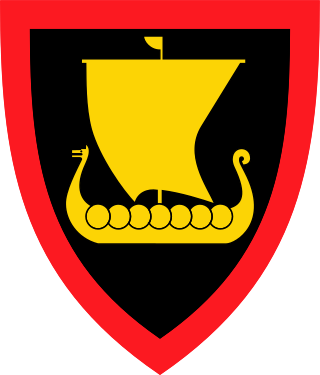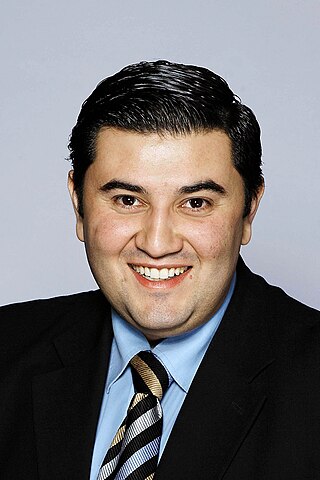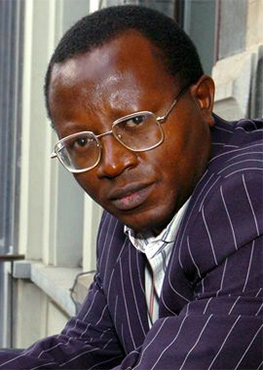
Najmadin Vahid Faraj Ahmad, better known as Mullah Krekar, is an Iraqi Kurdish Sunni Islamic scholar and militant who was the founder and former leader of Islamist militant group Ansar al-Islam. He is currently serving a prison sentence in Italy, after having been extradited from Norway in 2020. He came to Norway as a refugee from Iraqi Kurdistan in 1991. His wife, Rukhosh Ahmad, and his four children have Norwegian citizenship, but not Krekar himself. He speaks Kurdish, Arabic, Persian, Norwegian and English.

Per Sandberg is a Norwegian politician for the Capitalist Party and formerly the Progress Party who served as the Norwegian Minister of Fisheries from 2015 to 2018. Sandberg was a member of the Norwegian parliament from 1997 to 2017, and served as chair of the parliamentary standing committees on Justice, and Transport and Communications. He has additionally held the position of first deputy leader of the Progress Party from 2006 to 2018. In 1997 he was convicted of assault and battery of an asylum seeker. His status as a convicted felon has made him controversial in Norwegian politics.

The Telemark Bataljon is a mechanised infantry battalion of the Norwegian Army. It was established in 1993, and is a part of Brigade Nord and stationed at Rena, Hedmark. The battalion consists of five companies/squadrons.
Thomas Lubanga Dyilo is a convicted war criminal from the Democratic Republic of the Congo (DRC) and the first person ever convicted by the International Criminal Court (ICC). He founded and led the Union of Congolese Patriots (UPC) and was a key player in the Ituri conflict (1999–2007). Rebels under his command have been accused of massive human rights violations, including ethnic massacres, murder, torture, rape, mutilation, and forcibly conscripting child soldiers.
Erik Andersen, also referred to in the media as The Pocket Man, is a convicted Norwegian child molester from Bergen. He was arrested in 2008, accused of molesting hundreds of children since 1976, and in 2010, he was convicted and sentenced to preventive detention with a minimum term of 9 years, with the possibility of extension for as long as he is deemed a danger to society. He was released in November 2014.

The Baneheia murders was a double rape and murder, and a miscarriage of justice, that occurred in Norway on 19 May 2000. The victims were two girls, 10-year-old Lena Sløgedal Paulsen and 8-year-old Stine Sofie Austegard Sørstrønen. They were found raped and killed in the Baneheia area in Kristiansand. The murders received massive media attention in Norway in the early 2000s.

Mazyar Keshvari is an Iranian-born Norwegian former politician for the Progress Party and a convicted felon who is serving two prison sentences for fraud and violent threats. He was elected as a substitute member of the Norwegian parliament for the city of Oslo in 2013, representing the right-wing and anti-immigration Progress Party, and attended parliamentary sessions from 2013 to 2018 as the substitute of the mandate holder Siv Jensen who has been on leave from parliament during her government service. As a politician he was known for taking a hard stance on immigration, calling for a complete ban on further immigration to Norway, a stop to the practice of accepting asylum seekers in Norway, and the deportation of immigrants convicted of crimes. In 2019 he was convicted of aggravated fraud for defrauding the Norwegian parliament and in 2020 he was sentenced to 11 months imprisonment. He left the Norwegian parliament following his indictment in 2018 and also left the Progress Party in October 2019. In 2019 he was also arrested and charged with making violent threats, and he was convicted and sentenced to an additional four months in prison in 2020.
The sentence of life imprisonment under Norwegian law is restricted to the military penal code. In the civilian penal code, a law passed in 2002 allows for an indeterminate penalty that could, in theory, result in life imprisonment. The first Norwegian prisoner ever sentenced to the 21 years' preventive detention was Viggo Kristiansen, who was convicted of murder and rape, but exonerated in 2022.
Tjostolv Moland was a former Norwegian army officer and private security contractor or ex-mercenary arrested in May 2009 in the Democratic Republic of the Congo (DRC), and convicted of murdering their driver and espionage for Norway.

Democratic Republic of the Congo – Norway relations refer to the bilateral relations between Democratic Republic of the Congo and Norway. The Democratic Republic of the Congo is represented by a non-resident embassy in London. There are 1,930 DR Congolese people living in Norway. The Norwegian Ministry of Foreign Affairs discourages people to travel to the northern and eastern parts of the Congo.

Floribert Chebeya Bahizire was a leading Congolese human rights activist in the Democratic Republic of the Congo, hailed by the United Nations as "a champion of human rights". His death led to calls for an investigation from more than 50 organisations, including Amnesty International and Human Rights Watch, many countries and several senior UN officials, including Ban Ki-moon, Navi Pillay, Alan Doss and Philip Alston.

Fjotolf Hansen, better known by his birth name Anders Behring Breivik, is a Norwegian neo-Nazi terrorist. He is known primarily for committing the 2011 Norway attacks on 22 July 2011, in which he killed eight people by detonating a van bomb at Regjeringskvartalet in Oslo, and then killed 69 participants of a Workers' Youth League (AUF) summer camp, in a mass shooting on the island of Utøya.
The trial and conviction of Joshua French and Tjostolv Moland followed their arrest in May 2009, and their being charged with killing their hired driver, 47-year-old Abedi Kasongo, on May 5, 2009, at Bafwasende, Tshopo District, Orientale Province, Democratic Republic of Congo. French was arrested on May 9 in the Epulu game reserve, around 200 kilometres (120 mi) from Kisangani. Moland was arrested two days later in the Ituri Province, a few hundred kilometres farther northeast.

Trond Birkedal is a former Norwegian Progress Party politician who occupied a number of senior posts in his party, including as chairman of the Youth of the Progress Party and member of Progress Party's central executive committee and national board.
Sigrid Giskegjerde Schjetne was a Norwegian teenager who disappeared from the streets of suburban Oslo while walking in the early hours of Sunday, 5 August 2012.

The Orderud case was a triple murder that occurred in Norway on 22 May 1999. The victims were 47-year-old Anne Orderud Paust; her mother, 84-year-old Marie Orderud; and her father, 81-year-old Kristian Orderud, who were found shot and killed at their country estate in Sørum, Akershus.
Terrorism in Norway includes a list of major terrorist incidents where organized groups and lone wolves have tried carrying out attacks. In recent years, there has been a rise mostly of Islamic extremism and far-right violence and various groups have been suspected of terrorism plans.
Geir Eriksen, former names Geir Selvik and Geir Selvik Malthe-Sørenssen, is a Norwegian con artist and convicted felon. He formerly worked as a private investigator for criminal clients, and became known for fabricating material in the Arne Treholt case; it was subsequently revealed that he had engaged in similar fraud in a large number of other cases. He was charged with aggravated fraud and forgery; he pled guilty to all charges and in 2018 was sentenced to three years in prison and to pay 7 million kr in restitution. As of 2021 Malthe-Sørenssen was an inmate at Romerike Prison. He has changed his names several times, but is best known under the name Geir Selvik Malthe-Sørenssen, his legal name from 2010 to 2017. In 2021 his former wife Ida Marie Hansen published the book Jeg var gift med en bedrager about the Malthe-Sørenssen case.
Murder in Kinshasa is a 2011 Al Jazeera investigative film suggesting that Congolese president Laurent-Désiré Kabila was assassinated in 2001 through the efforts of the Rwandan government, with the backing of the United States. According to the film, international disputes over mineral and natural resources led to Kabila's assassination. The film argues that Eddy Kapend and the dozens of guards who were convicted and sentenced to death — in a trial criticized by human rights organizations — played no part in Kabila's death. Murder in Kinshasa was directed and edited by journalists Arnaud Zajtman and Marlène Rabaud.
Capital punishment in the Democratic Republic of the Congo is legal; however, the nation has not carried out any executions since 2003, meaning that the country experienced a de facto moratorium on the death penalty from their latest executions in 2003 until March 2024.










